Related Research Articles
Spirituals is a genre of Christian music that is associated with African Americans, which merged varied African cultural influences with the experiences of being held in bondage in slavery, at first during the transatlantic slave trade and for centuries afterwards, through the domestic slave trade. Spirituals encompass the "sing songs", work songs, and plantation songs that evolved into the blues and gospel songs in church. In the nineteenth century, the word "spirituals" referred to all these subcategories of folk songs. While they were often rooted in biblical stories, they also described the extreme hardships endured by African Americans who were enslaved from the 17th century until the 1860s, the emancipation altering mainly the nature of slavery for many. Many new derivative music genres such as the blues emerged from the spirituals songcraft.

Harry Burleigh was an American classical composer, arranger, and professional singer known for his baritone voice. The first black composer who was instrumental in developing characteristically American music, Burleigh made black music available to classically trained artists both by introducing them to spirituals and by arranging spirituals in a more classical form. Burleigh also introduced Antonín Dvořák to Black American music, which influenced some of Dvořák's most famous compositions and led him to say that Black music would be the basis of an American classical music.
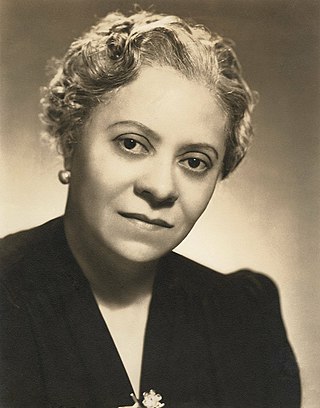
Florence Beatrice Price was an American classical composer, pianist, organist and music teacher. Born in Little Rock, Arkansas, Price was educated at the New England Conservatory of Music, and was active in Chicago from 1927 until her death in 1953. Price is noted as the first African-American woman to be recognized as a symphonic composer, and the first to have a composition played by a major orchestra. Price composed over 300 works: four symphonies, four concertos, as well as choral works, art songs, chamber music and music for solo instruments. In 2009, a substantial collection of her works and papers was found in her abandoned summer home.

"Who Killed Cock Robin" is an English nursery rhyme. It has a Roud Folk Song Index number of 494.

Dichterliebe, A Poet's Love, is the best-known song cycle by Robert Schumann. The texts for its 16 songs come from the Lyrisches Intermezzo by Heinrich Heine, written in 1822–23 and published as part of Heine's Das Buch der Lieder. Along with the song cycles of Franz Schubert, Schumann's form the core of the genre in musical literature.

A Christian burial is the burial of a deceased person with specifically Christian rites; typically, in consecrated ground. Until recent times Christians generally objected to cremation because it interfered with the concept of the resurrection of a corpse, and practiced inhumation almost exclusively. Today this opposition has all but vanished among Protestants and Catholics alike, and this is rapidly becoming more common, although Eastern Orthodox Churches still mostly forbid cremation.
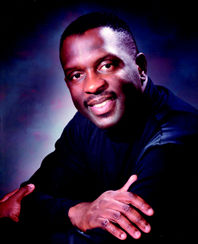
Moses George Hogan was an American composer and arranger of choral music. He was best known for his settings of spirituals. Hogan was a pianist, conductor, and arranger of international renown. His works are celebrated and performed by high school, college, church, community, and professional choirs today. Over his lifetime, he published 88 arrangements for voice, eight of which were solo pieces.
"Mary Don't You Weep" is a Spiritual that originates from before the American Civil War – thus it is what scholars call a "slave song", "a label that describes their origins among the enslaved", and it contains "coded messages of hope and resistance". It is one of the most important of Negro spirituals. It is listed as number 11823 in the Roud Folk Song Index.
"This Little Light of Mine" is an African-American song from the 1920s. It was often reported to be written for children in the 1920s by Harry Dixon Loes, but he never claimed credit for the original version of the song, and researchers at the Moody Bible Institute, where Loes worked, said they have found no evidence that he wrote it. It was later adapted by Zilphia Horton, amongst many other activists, in connection with the civil rights movement.
"There Is A Balm in Gilead" is a traditional African American spiritual. The date of composition is unclear, though the song dates at least to the 19th century. A version of the refrain can be found in Washington Glass's 1854 hymn "The Sinner's Cure". The Clark Sisters recorded a version of Balm In Gilead in 1986.
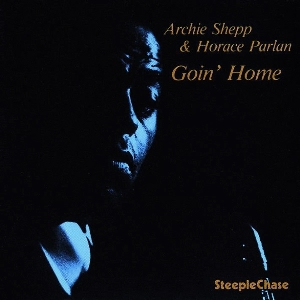
Goin' Home is a studio album by American saxophonist Archie Shepp and pianist Horace Parlan. After their work in the 1960s, Shepp and Parlan both faced career challenges as the jazz scene diverged stylistically. They left the United States for Europe during the 1970s and met each other in Denmark before recording the album on April 25, 1977, at Sweet Silence Studio in Copenhagen.
Wallace Willis was a Choctaw freedman living in the Indian Territory, in what is now Choctaw County, near the city of Hugo, Oklahoma, US. His dates are unclear: perhaps 1820 to 1880. He is credited with composing several Negro spirituals. Willis received his name from his owner, Britt Willis, probably in Mississippi, the ancestral home of the Choctaws. He died, probably in what is now Atoka County, Oklahoma, as his unmarked grave is located there.
Maurice Arnold Strothotte was an American composer and performer.

"Nobody Knows the Trouble I've Seen" is an African-American spiritual song that originated during the period of slavery but was not published until 1867. The song is well known and many cover versions of it have been done by artists such as Marian Anderson, Lena Horne, Louis Armstrong, Harry James, Paul Robeson, and Sam Cooke among others. Anderson had her first successful recording with a version of this song on the Victor label in 1925. Horne recorded a version of the song in 1946. The Deep River Boys recorded their version in Oslo on August 29, 1958. It was released on the extended play Negro Spirituals Vol. 1, and the song was arranged by Harry Douglas.
"Shine, Shine, My Star" is an acclaimed Russian romance.
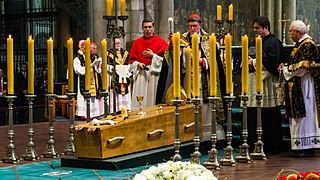
Absolution of the dead is a prayer for or a declaration of absolution of a dead person's sins that takes place at the person's religious funeral.
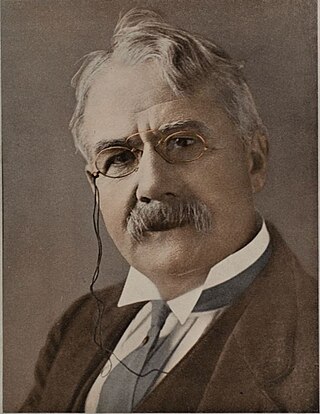
Frank Lebby Stanton, frequently credited as Frank L. Stanton, Frank Stanton or F. L. Stanton, was an American lyricist.
Hun and po are types of souls in Chinese philosophy and traditional religion. Within this ancient soul dualism tradition, every living human has both a hun spiritual, ethereal, yang soul which leaves the body after death, and also a po corporeal, substantive, yin soul which remains with the corpse of the deceased. Some controversy exists over the number of souls in a person; for instance, one of the traditions within Daoism proposes a soul structure of sanhunqipo (三魂七魄), i.e., "three hun and seven po". The historian Yü Ying-shih describes hun and po as "two pivotal concepts that have been, and remain today, the key to understanding Chinese views of the human soul and the afterlife".
"Didn't It Rain", sometimes given as "Oh, Didn't It Rain", is a spiritual about Noah's flood. In 1919 it appeared as sheet music in an arrangement for voice and piano by Henry Thacker Burleigh (1866–1949).
Singing the Living Tradition is a hymnal published by the Unitarian Universalist Association.
References
- ↑ Krehbiel, Henry Edward (1914). Afro-American Folksongs: A Study in Racial and National Music. G.Schirmer. p. 103 . Retrieved 29 July 2017.
- ↑ "" Dig My Grave," one of "Two Negro Spirituals" by Harry Thacker Burleigh". Library of Congress .
- ↑ "Dig My Grave," one of "Two Negro Spirituals" by Harry Thacker Burleigh" Found at the Library of Congress
- ↑ "Dig My Grave - Bahamas".